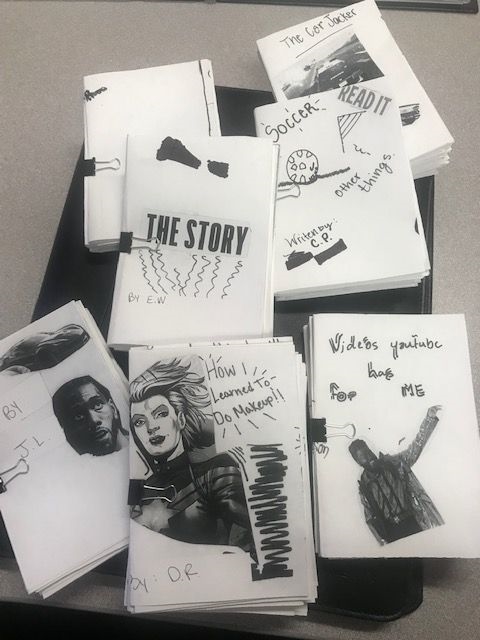The Business Communication Lab at the Sam M. Walton College of Business partnered with the Washington County Juvenile Detention Center to create a literacy workshop for incarcerated youth.
The workshop, held July 16, was led by the lab's assistant director, Jessi Schnebelen, and tutor Nathan Riggs. It explored nine students' personal literacy histories through zine-making.
Zines—a form a self-publishing that has long amplified voices from outside the mainstream—were the perfect vehicle to help students explore their own histories with literacy. Schnebelen said the lab chose the zine format because, "We wanted to stress to students that your history with literacy is unique. There is no single right way to acquire literacy. We felt like zines were the perfect outlet for exploring these histories because the form is accessible and gives students room to be creative while providing them with the tools necessary to independently improve their own literacy skills."
The students created zines about cosmetics, sports, YouTube, and soccer, among other topics. The exercise allowed students to explore their areas of expertise and to share that narrative with an external audience. "Giving students authorship of their own stories and creating an awareness of how literacy is acquired allows students to analyze the process of gaining literacy," Schnebelen said. "It empowers them to improve their desired literacy intentionally—you want students to feel confident making conscious literacy choices going forward so they can develop these skills and use them to go to school, apply for jobs, or take the G.E.D."
Zinemaking is not just about creating the work; it's also about distributing the finished products. Riggs, a recent graduate of the U of A's graduate program in English, made sure the zines got out of the classroom. Already attending Greensboro Zine Fest in Greensboro, North Carolina, to showcase his own work, Riggs took along copies of the zines made by the students to distribute for free.
"We asked for people who took the zines to follow our Instagram—@jdczineproject—so we can spread the students' work and the idea of zine outreach in general," Riggs said. "A lot of zinemakers really care about this kind of outreach, so I found a lot of enthusiasm for the work in Greensboro. I gave out all of the copies I took." The students were encouraged to follow the Instagram account so they can see how their texts interact with external audiences and begin to envision themselves as authors of their own stories and literacies.
The lab hopes that the workshop will be adopted by other people and organizations looking to explore service learning and outreach with juvenile detention centers in their communities. Educational programs are key to reducing recidivism and reintegrating incarcerated youth back into their home and school lives, Schnebelen said. The lab plans to create resources to guide others in running similar workshops. These resources will be added to their library of online literacy guides, but Schnebelen and Riggs also plan on making a zine to distribute at zine festivals with instructions so other zinemakers can lead their own workshops back home.
"Zines are about expression, networking, and fostering communities," Riggs said. "We hope that the zine workshop helped students express themselves in the short term, and we hope that we can build a community of JDC voices communicating with each other and with fans of zines all over the country in the long term. We all benefit from more voices being heard."
For more information on the Walton Business Communication Lab's Juvenile Detention Center Zine Project, contact Jessi Schnebelen at jschnebelen@walton.uark.edu
Contacts
Jessi Schnebelen, assistant director
Business Communication Lab
479-575-4896,
